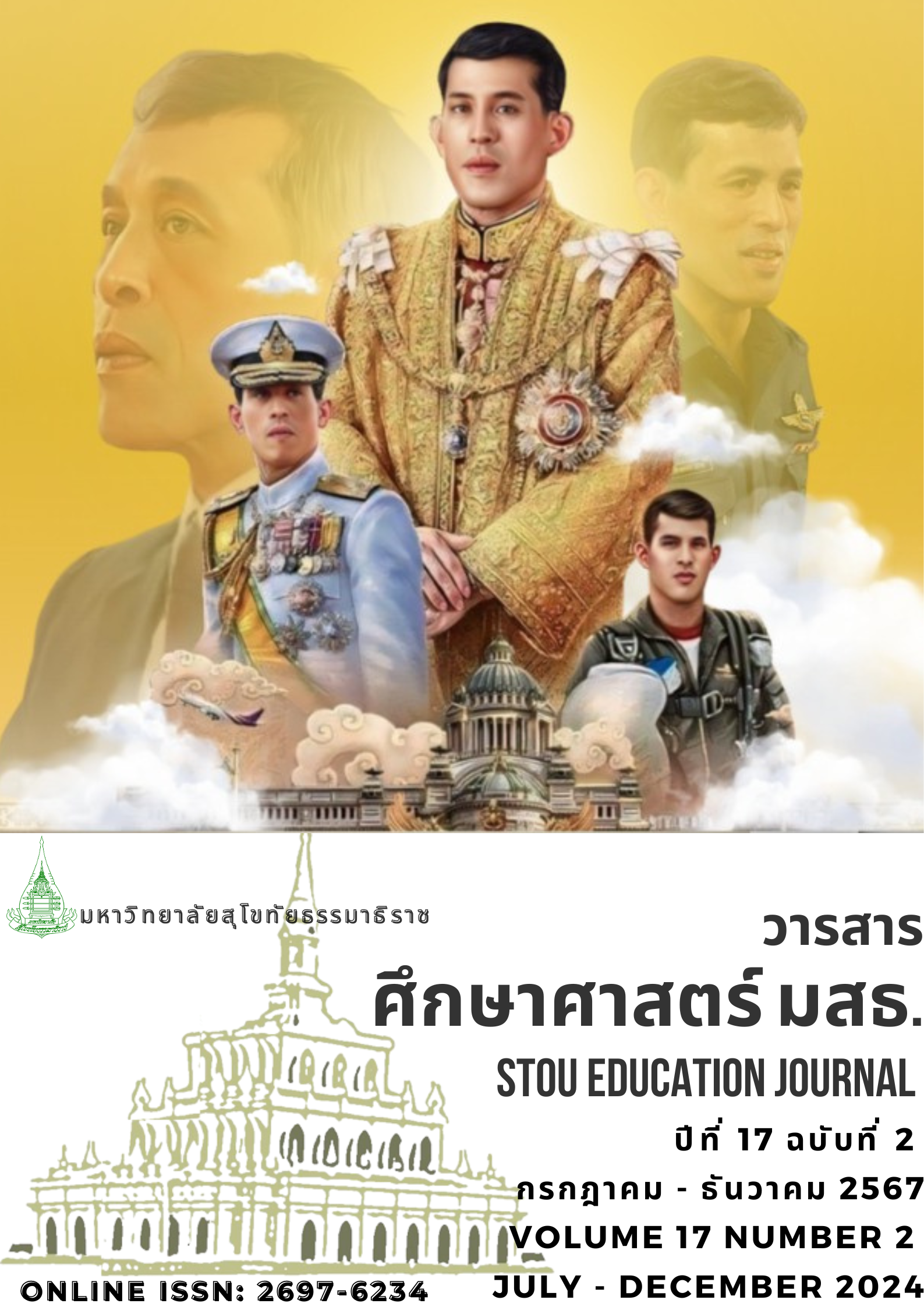การพัฒนาความเชื่อมั่นแห่งตนในการให้การปรึกษาและการเข้าอกเข้าใจ : กรณีศึกษา กลุ่มพัฒนาตนนักเรียนเพื่อนที่ปรึกษาแบบออนไลน์
Main Article Content
บทคัดย่อ
การวิจัยนี้มีวัตถุประสงค์เพื่อศึกษา 1) การพัฒนาความเชื่อมั่นแห่งตนในการให้การปรึกษาของนักเรียนเพื่อนที่ปรึกษา 2) การพัฒนาการเข้าอกเข้าใจผู้รับการปรึกษาของนักเรียนเพื่อนที่ปรึกษา และ 3) รูปแบบของกลุ่มพัฒนาตนแบบออนไลน์ที่ส่งเสริมความเชื่อมั่นแห่งตนในการให้การปรึกษาและการเข้าอกเข้าใจผู้รับการปรึกษาของนักเรียนเพื่อนที่ปรึกษา โดยใช้วิธีการคัดเลือกผู้ให้ข้อมูลแบบเจาะจง คัดเลือกนักเรียนชั้นมัธยมศึกษาตอนปลายที่ได้รับการแต่งตั้งจากโรงเรียนให้ทำหน้าที่นักเรียนเพื่อนที่ปรึกษาของโรงเรียน 3 แห่งที่ตั้งอยู่ในเขตภาคใต้ ประจำปีการศึกษา 2565 จำนวน 20 คน ที่มีประสบการณ์เข้าร่วมกลุ่มพัฒนาตนแบบออนไลน์อย่างต่อเนื่อง 6 ครั้ง ครั้งละ 90 นาที และสมัครใจเข้าร่วมให้ข้อมูลด้วยวิธีการสนทนากลุ่ม เครื่องมือเก็บรวบรวมข้อมูลคือแบบสัมภาษณ์แบบกึ่งโครงสร้าง วิเคราะห์ข้อมูลเชิงเนื้อหา ผลการศึกษาปรากฏว่า 1) การพัฒนาความเชื่อมั่นแห่งตนในการให้การปรึกษาประกอบด้วย ความรู้พื้นฐานด้านการให้การปรึกษา และการฝึกฝนทักษะสร้างความเชื่อมั่นแห่งตนในการให้การปรึกษา 2) การพัฒนาการเข้าอกเข้าใจผู้รับการปรึกษา ประกอบด้วย เพื่อนผู้ใส่ใจค้นหาความรู้สึกที่แท้จริงของเพื่อน และเพื่อนผู้ปรารถนาให้เพื่อนพ้นทุกข์ และ 3) รูปแบบของกลุ่มพัฒนาตนนักเรียนเพื่อนที่ปรึกษาแบบออนไลน์ ได้แก่ (3.1) รูปแบบกิจกรรมที่ส่งเสริมความเชื่อมั่นแห่งตนในการให้การปรึกษา ประกอบด้วย การใช้สื่อวิดีโอ การส่งเสริมการฟังที่ดี การสอนและให้ข้อเสนอแนะจากผู้นำกลุ่ม การสวมบทบาทสมมุติ และการดำเนินกิจกรรมอย่างต่อเนื่อง และ (3.2) รูปแบบกิจกรรมที่ส่งเสริมการพัฒนาการเข้าอกเข้าใจ ประกอบด้วย การทบทวนชีวิตและความรู้สึกปัจจุบัน การแบ่งปันเรื่องราวและความรู้สึก และการให้ข้อเสนอแนะจากผู้นำกลุ่ม
Article Details
เอกสารอ้างอิง
American Psychological Association. (2023). Peer counseling. In APA dictionary of psychology. https://dictionary.apa.org/peer-counseling
Bandura, A. (1978). Self-efficacy: Toward a unifying theory of behavioral change. Advances in Behaviour Research and Therapy, 1(4), 139–161. https://doi.org/10.1016/0146-6402(78)90002-4
Bandura, A. (1995). Self-efficacy in changing societies. Cambridge University Press.
Bandura, A. (1997). Self-Efficacy: The exercise of control. W. H. Freeman.
Bururia, D., Marangu, P. G., & Nyaga, J. N. (2014). Contribution of peer counseling to student behavior change in secondary schools in Maara Sub County, Kenya. Journal of Educational Policy and Entrepreneurial Research, 1(2), 86–9. http://jeper.org/index.php/JEPER/article/download/21/21
Derntl, B., & Regenbogen, C. (2014). Empathy. In Elsevier eBooks (pp. 69–81). https://doi.org/10.1016/b978-0-12-405172-0.00004-1
Gaspar, A., & Esteves, F. (2022). Empathy development from adolescence to adulthood and its consistency across targets. Frontiers in Psychology, 13. https://doi.org/10.3389/fpsyg.2022.936053
Kallio, H., Pietilä, A. M., Johnson, M., & Kangasniemi, M. (2016). Systematic methodological review: Developing a framework for a qualitative semi-structured interview guide. Journal of advanced nursing, 72(12), 2954–2965. https://doi.org/10.1111/jan.13031
Miklikowska, M., Tilton‐Weaver, L., & Burk, W. J. (2022). With a little help from my empathic friends: The role of peers in the development of empathy in adolescence. Developmental Psychology, 58(6), 1156–1162. https://doi.org/10.1037/dev0001347
Naini, R., Wibowo, M. E., & Mulawarman, M. (2021). Efficacy of online group counseling with mindfulness-based cognitive approach to enhance students’ humility. Islamic Guidance and Counseling Journal, 4(1), 78–90. https://doi.org/10.25217/igcj.v4i1.1280 Office of the Basic Education Commission. (2021). Student peer counseling handbook, Volume 3.
Ooi, P. B., Jaafar, W. M. W., & Crosling, G. (2021). Malaysian school counselor’s self-efficacy: The key roles of supervisor support for training, mastery experience, and access to training. Frontiers in Psychology, 12. https://doi.org/10.3389/fpsyg.2021.749225
Ploysophon, A., Vinitasatitkun, P., Wachirawin, A., & Ruangkeaw, R. (2021). An effectiveness of peer counseling competency development program for undergraduate students in the faculty of education Suan Dusit University. Journal of MCU Humanities Review, 7(1), 317–330. https://so03.tci-thaijo.org/index.php/human/article/view/177612
Rogers, C. R. (1951). Client-centered therapy, its current practice, implications, and theory. Houghton Mifflin Harcourt (HMH).
Salsabila, W. J., Salsabila, N., & Alhad, M. A. (2020). The role of peer counseling on mental health. Bisma The Journal of Counseling, 4(3), 242–253. https://ejournal.undiksha.ac.id/index.php/bisma
Schiele, B. E., Weist, M. D., Youngstrom, E. A., Stephan, S. H., & Lever, N. (2014). Counseling self-efficacy, quality of services and knowledge of evidence-based practices in school mental health. The Professional Counselor, 4(5), 467–480. https://doi.org/10.15241/bes.4.5.467
Schwarzer, R., & Jerusalem, M. (1995). General Self-Efficacy Scale (GSE) [Database record]. APA PsycTests.
Shao, J., Li, X., Fan, F., Wu, J., & Wang, W. (2022). “I get you”: A qualitative study on group members’ empathic expression. Group Dynamics: Theory, Research, and Practice, 26(2), 151–168. https://doi.org/10.1037/gdn0000173
Spielberger, C. (2004). Encyclopedia of applied psychology. Academic Press.
Trotzer, J. P. (2006). The counselor and the group: Integrating theory, training, and practice. CRC Press.
Trotzer, J. P. (2013). Conducting a group: Guidelines for choosing and using activities. In SAGE Publications, Inc. eBooks (pp. 76–90). https://doi.org/10.4135/9781452229683.n6
Urbani, S., Smith, M. R., Maddux, C. D., Smaby, M. H., Torres‐Rivera, E., & Crews, J. (2002). Skills‐based training and counseling self‐efficacy. Counselor Education and Supervision, 42(2), 92–106. https://doi.org/10.1002/j.1556-6978.2002.tb01802.x
Vanderley, I. C. S., De Albuquerque Sibalde Vanderley, M., Da Silva Santana, A. D., Scorsolini-Comin, F., Neto, W. B., & Monteiro, E. M. L. M. (2020). Fatores relacionados à resiliência de adolescentes em contextos de vulnerabilidade social: revisão integrativa. Enfermería Global, 19(3), 582–625. https://doi.org/10.6018/eglobal.411311
Weinberg, H. (2021). Obstacles, challenges, and benefits of online group psychotherapy. American Journal of Psychotherapy, 74(2), 83–88. https://doi.org/10.1176/appi.psychotherapy.20200034
Wiangnak, P., & Taephant, N. (2020). Psychological experience of junior high school students with increased self-esteem after participating in personal growth group with gardening. Journal of MCU Humanities Review, 6(1), 1–17. https://so03.tci-thaijo.org/index.php/human/ article/view/243306
World Health Organization (WHO). (2021). 2021 global school-based student health survey. https://cdn.who.int/media/docs/default-source/ncds/2021-thailand-gshs-fact-sheet.pdf
Yin, R. K. (2009). Case study research: Design and methods. SAGE.


